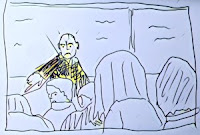The punitive versus the empathetic mindset
Some time ago, I heard about a situation in which a student behaved disruptively in class. I will repeat here, from memory, what happened. The teacher asked the student if he would calmly join the lesson and pay attention. The student did not directly reply and went on with his disruptive behavior. Then some other students started making comments like: "Just send him to the hall, miss." The teacher replied: "No, I will not send him to the hall", to which the students said: "Why not? He is behaving very badly." The teacher replied: "If I send students to the hall, they will not learn how to behave appropriately in the classroom. That is why I won't do that." Then she repeated here question to the student to calmly pay attention to the lesson which he then started to do without complaining. This approach seems counter-intuitive. Shouldn't you just be tough to students behaving badly? Maybe not. A new paper provides some insight into what might have worked in this situation.
Finally, a longitudinal field experiment was conducted in which a brief online intervention was done in three districts to encourage a more empathetic way of responding in math teachers (Nteachers=31; Nstudents=1682). This intervention helped to reduce the number of suspensions from 9,6% to 4,8%. Also, the respect of students for teacher increased.
Implications: however understandable it is that teachers can tend to punish disruptive students, it seems likely that this will only make problems worse. An understanding response in which students are not labeled as problematic and in which attention is paid to the teaching of desired behavior is more promising. Less punishment, more respect.
A punitive versus empathetic response to problem behavior
Okonufa et al. (2016) studied two different mindsets of teachers about problem behavior of students: a punitive mindset and an empathetic mindset. The researchers had noted that an increase had happened in American education in the tendency to punish students by suspending them. Based on previous research they expected that this way thinking and acting would not solve problems but make them worse. By suspending disruptive students, the opportunity disappears to teach them the desired behavior, the relationship between student and teacher gets undermined, and the student becomes alienated. Because of these things, problems get worse. A negative spiral emerges.
A cognitive empathetic way of responding may work better. In this way of responding the problematic behavior isn't seen as conscious sabotage but as a consequence of not having learned what is expected in the situation. The teacher shows confidence and respect for the situation and the perspective of the student which leads to a better relationship which, in turn, can increase the chance of the student adapting to the expectations in class. The researchers did a few experiments to test these expectations.
Teachers can be encouraged to adopt an empathetic mindset
In experiment 1 the researchers examined whether teachers (N=39) could be encouraged to adopt an empathetic mindset instead of a punitive mindset. The teachers were randomly assigned to one of two conditions. In condition 1 they read an article emphasizing the importance of good relationships with problem students. In condition 2 they read an article emphasizing the importance of punishment and controlling the classroom. Then these teachers were asked to respond to three incidents of problem behavior. The group who had read the empathy-article were less punitive and more empathetic. It is thus possible to relatively easily influence teachers mindsets.More respect for the empathetic response
In experiment 2 the researchers studied whether an empathetic response to problem behavior would leave the respect for the teacher and the motivation for the lesson intact. College students (N=302) were asked to imagine that they were mid-school students. In condition 1 they were exposed to a punitive teacher, in condition 2 to an empathetically responding teacher. As predicted, the empathetic teacher was much more respected than the punitive teacher.Finally, a longitudinal field experiment was conducted in which a brief online intervention was done in three districts to encourage a more empathetic way of responding in math teachers (Nteachers=31; Nstudents=1682). This intervention helped to reduce the number of suspensions from 9,6% to 4,8%. Also, the respect of students for teacher increased.
Implications: however understandable it is that teachers can tend to punish disruptive students, it seems likely that this will only make problems worse. An understanding response in which students are not labeled as problematic and in which attention is paid to the teaching of desired behavior is more promising. Less punishment, more respect.

Comments